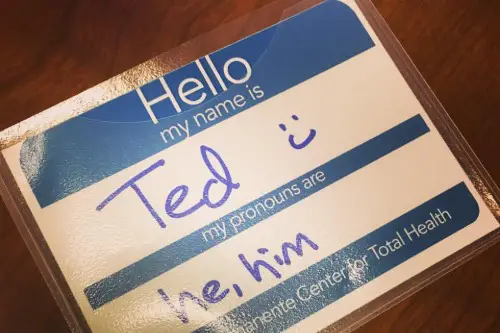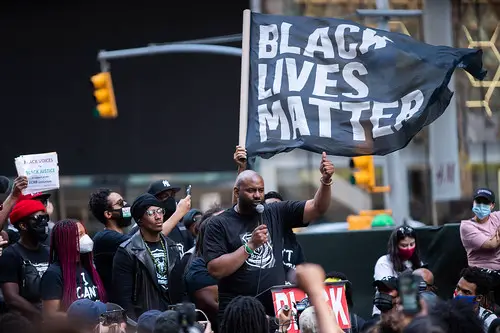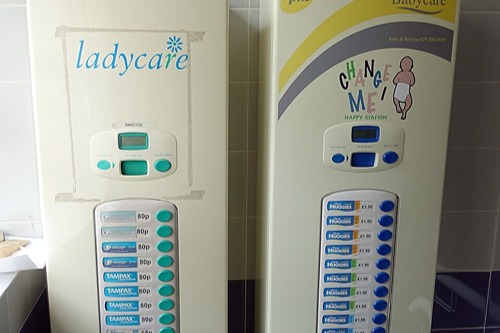1. Acknowledging Someone’s Pronouns

In many countries, using someone’s correct pronouns is just seen as respectful—like getting someone’s name right. But in the U.S., it’s often branded as a political stance, especially in school policies and workplace guidelines. Some states have even tried to ban pronoun use that doesn’t align with a person’s assigned sex at birth. What’s often lost in the debate is that this is just about treating people the way they want to be treated.
Countries like Sweden and Canada have widely adopted gender-neutral pronouns in everyday use. It’s not framed as “woke,” it’s just how they talk. Meanwhile, in the U.S., even mentioning pronouns in email signatures can spark controversy. That divide turns what’s a basic courtesy elsewhere into a cultural flashpoint here.
2. Saying “Black Lives Matter”

Globally, many people embraced “Black Lives Matter” as a call for racial equality after the murder of George Floyd. In the U.S., saying it out loud—or even putting it on a yard sign—can be considered a divisive political act. Several public employees have been disciplined for showing support in schools or government offices. Some states have pushed back on BLM murals or classroom discussions.
In countries like the UK, Australia, and Germany, support for the movement often centered on listening and reform. It wasn’t framed as being against police, but about ensuring accountability. The U.S. has a uniquely polarized response, turning a plea for justice into a partisan argument. That says more about our political landscape than the phrase itself.
3. Acknowledging Indigenous Land

Across countries like Canada and New Zealand, land acknowledgments are common at public events and in schools. They serve as reminders of Indigenous history and presence, not political declarations. In the U.S., however, similar statements are frequently called “divisive” or “anti-American.” Some schools and local governments have even faced backlash for adopting them.
Land acknowledgments aim to show respect, not rewrite history. They’re about honoring those who lived on the land before colonization, a fact that is, well, a fact. Still, in the U.S., merely mentioning stolen land can lead to accusations of being “too liberal.” It’s a simple gesture that’s treated like a revolutionary act.
4. Teaching Accurate Racial History

In many developed countries, students learn about colonialism, slavery, and systemic injustice as part of their national curriculum. But in the U.S., attempts to teach about racism—especially through frameworks like Critical Race Theory—are met with fierce resistance. Several states have banned or restricted how teachers can discuss race in the classroom. The idea that history can be uncomfortable is treated as if it’s dangerous.
Elsewhere, facing national shame is part of civic education. Germany, for example, mandates Holocaust education with no fear it will “make kids feel bad.” In contrast, U.S. critics argue that acknowledging racial injustice will cause guilt or division. So what’s standard history elsewhere is considered a political powder keg here.
5. Supporting Universal Healthcare

In nearly every other industrialized nation, healthcare is seen as a basic human right. But in the U.S., advocating for universal healthcare often gets painted as socialism or government overreach. Even talking about models like Canada’s or the UK’s can lead to heated arguments. Politicians still call it a “radical” idea.
Meanwhile, countries with nationalized healthcare have better health outcomes and lower costs. It’s not a perfect system, but it’s one most people support across party lines. In the U.S., the debate is so political that “Medicare for All” becomes a campaign lightning rod. Somewhere along the way, caring for each other became controversial.
6. Saying “Happy Holidays”

In places like the UK, Australia, or even Canada, saying “Happy Holidays” is just a nice way to include everyone. But in the U.S., some people treat it like an attack on Christmas. There’s even a term for it—“the War on Christmas.” Politicians and pundits bring it up every year like clockwork.
The irony is that “Happy Holidays” covers Christmas and other celebrations like Hanukkah, Kwanzaa, and New Year’s. It’s meant to be kind and considerate. Still, some Americans insist that anything less than “Merry Christmas” is political correctness gone wild. A greeting meant to unify ends up dividing.
7. Addressing Climate Change

In most of Europe and much of Asia, climate change is treated as an environmental issue, not a political identity. Citizens expect their leaders to take science seriously and act accordingly. But in the U.S., climate action is often framed as liberal alarmism or government intrusion. Entire policies are shaped by whether people “believe” in the science.
Globally, there’s broad agreement that the climate crisis is real and urgent. Schoolkids in Sweden go on strike to demand action, and it’s not seen as radical—it’s civic engagement. In the U.S., acknowledging the climate crisis can label you an extremist in some regions. It’s a basic survival issue that somehow became a partisan badge.
8. Letting Kids Wear What They Want

Across much of Europe and Latin America, school dress codes are relatively relaxed, especially around gender expression. In the U.S., clothing choices—especially for girls and LGBTQ+ youth—can spark disciplinary action or media outrage. Some states have banned clothing that “promotes gender ideology.” Others enforce vague rules that often disproportionately target students of color.
Clothing is often a form of self-expression and comfort. In many countries, letting kids choose what to wear is seen as fostering confidence and inclusion. But in the U.S., a tank top or pride shirt can be deemed a political statement. It’s just a shirt—until someone turns it into a controversy.
9. Offering Menstrual Products in Public Restrooms

In Scotland, menstrual products are free in all public buildings, including schools and libraries. It’s treated as a health necessity, not a luxury. But in the U.S., offering tampons in restrooms often leads to debates about budgets, gender, and “catering to the woke.” Several proposals to make products freely available have been blocked or watered down.
This is a health issue half the population deals with regularly. It’s about dignity and hygiene, not politics. Yet in the U.S., it’s framed as a liberal push for “entitlement.” Elsewhere, it’s common sense—here, it’s controversial.
10. Feeding Hungry Students Without Shaming Them

Many countries provide free school lunches to all kids, no questions asked. In Finland, France, and Brazil, it’s just part of public education. In the U.S., school lunch debt can lead to students being denied meals or even publicly shamed. Some districts have threatened to send kids to foster care over unpaid lunch bills.
Efforts to make meals universally free are often dismissed as too expensive or socialist. But feeding children is a basic act of care, not a political ideology. Where other nations see this as routine support, the U.S. sees it as a culture war issue. Kids just want to eat—not get caught in red vs. blue.
11. Including Accessibility Features

In many countries, accessibility isn’t up for debate—it’s built into sidewalks, websites, and transit systems as a matter of law and expectation. But in the U.S., accessibility upgrades are sometimes labeled as “woke” or “a burden on small business.” Some even argue against closed captioning or alt-text as “extra work.” Disability advocates often face resistance that frames inclusion as an overreach.
Other countries treat accessibility as a standard, not a favor. It’s not political to install a ramp—it’s respectful. Yet here, people sometimes have to fight just to be acknowledged. What’s normal elsewhere is seen as special treatment here.
12. Respecting Work-Life Balance

In much of Europe, the idea of shutting down email after 5 p.m. is normal. France has a “right to disconnect” law that protects workers’ time outside of the office. In the U.S., asking for strict boundaries or adequate vacation can get you labeled unambitious or “entitled.” Remote work flexibility is still debated like a moral question.
Work is important, sure—but so is rest. Many countries prioritize worker well-being and see productivity as tied to mental health. The U.S., on the other hand, glorifies overwork and treats burnout like a badge of honor. What’s basic balance abroad is “political” hustle-culture rebellion here.
This post 12 Things That Got Labeled “Too Political” in the U.S. That Are Just Basic Courtesy Elsewhere was first published on American Charm.


